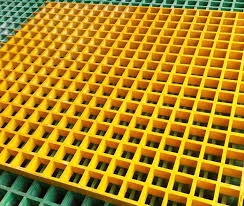loading...
- No. 9, Xingyuan South Street, Dongwaihuan Road, Zaoqiang County, Hengshui, Hebei, China
- admin@zjcomposites.com
- +86 15097380338
- Welcome to visit our website!
Durable and Lightweight Fiberglass Mesh for Walkway Applications
Fibreglass Walkway Mesh A Sustainable Solution for Safe and Durable Surfaces
In today's fast-paced world, the demand for durable and safe construction materials has never been higher. Among various materials, fibreglass walkway mesh has emerged as a superior option for a wide range of applications, ranging from industrial settings to commercial buildings and even residential areas. This versatile material showcases numerous advantages that make it a favorite choice for engineers and architects alike.
Fibreglass walkway mesh, also known as fibreglass grating or fibreglass reinforced plastic (FRP) grating, consists of intertwined strands of fibreglass that provide incredible strength while remaining lightweight. Its manufacturing process involves combining resin, silica sand, and glass fibers, resulting in a product that is not only durable but also chemically resistant. This resistance makes it an ideal choice for locations exposed to harsh environments, including chemical processing plants, water treatment facilities, and coastal areas.
One of the most significant advantages of fibreglass walkway mesh is its non-slip surface. Safety is a primary concern in environments where foot traffic is common. Fibreglass grating can be designed with a textured surface to enhance grip, reducing the risk of slips and falls. This feature is especially crucial in settings where workers are often required to wear safety boots or navigate wet or oily surfaces. By prioritizing safety, fibreglass walkway mesh contributes to a safer work environment, thereby promoting employee well-being and productivity.
Another key benefit of fibreglass walkway mesh is its lightweight nature. Compared to traditional materials like steel or aluminum, fibreglass is far easier to handle and install. This not only reduces labor costs but also minimizes the time required for installation. In addition, lighter materials put less stress on supporting structures, making fibreglass grating an excellent choice for applications where weight concerns are paramount, such as in rooftop walkways or above-ground platforms.
fibreglass walkway mesh

Moreover, fibreglass walkway mesh offers exceptional longevity. It is resistant to corrosion, rust, and UV radiation, meaning that it retains its structural integrity over time. This durability translates to lower maintenance costs and a longer life cycle, making it a cost-effective option in the long run. In comparison, materials that are prone to degradation often require frequent replacements and repairs, adding to the overall expense.
Sustainability is another important factor to consider in today's construction practices. Fibreglass walkway mesh is often made from recycled materials, making it a more environmentally friendly option. Additionally, its longevity reduces the need for frequent replacements, further minimizing its environmental footprint. As businesses increasingly focus on sustainable practices, choosing fibreglass can help demonstrate commitment to eco-friendly solutions.
Finally, the versatility of fibreglass walkway mesh allows it to suit a variety of applications. From pedestrian walkways and industrial platforms to drainage covers and stair treads, the possibilities are virtually endless. Furthermore, fibreglass can be molded into different shapes, sizes, and colors, allowing for customization to meet specific project requirements.
In conclusion, fibreglass walkway mesh stands out as a safe, durable, and sustainable choice for various construction needs. With its non-slip surface, lightweight nature, resistance to environmental factors, and low maintenance requirements, it significantly enhances the safety and efficiency of any project. As we continue to prioritize safety and sustainability in the construction industry, fibreglass walkway mesh is likely to play a vital role in shaping our future environments. Whether for commercial, industrial, or residential use, this innovative material is paving the way for a safer and more durable tomorrow.
-
The Rise of FRP Profiles: Strong, Lightweight, and Built to LastNewsJul.14,2025
-
SMC Panel Tanks: A Modern Water Storage Solution for All EnvironmentsNewsJul.14,2025
-
GRP Grating: A Modern Solution for Safe and Durable Access SystemsNewsJul.14,2025
-
Galvanized Steel Water Tanks: Durable, Reliable, and Ready for UseNewsJul.14,2025
-
FRP Mini Mesh Grating: The Safer, Smarter Flooring SolutionNewsJul.14,2025
-
Exploring FRP Vessels: Durable Solutions for Modern Fluid HandlingNewsJul.14,2025
-
GRP Structures: The Future of Lightweight, High-Performance EngineeringNewsJun.20,2025
